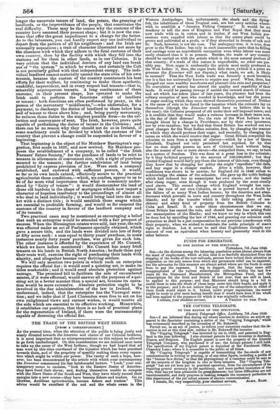THE TRADE OF THE BRITISH WEST INDIES.
[FROM A CORRESPONDENT.]
1.T the present time, when the attention of the public is being justly and wisely directed towards the interests and claims of our Colonial brethren, it is most important that no misrepresentations on this subject be allowed to go forth unchallenged. On this consideration we are induced once more to take up the cause of the West Indians; though we had hoped that all men were by this time convinced of the injustice which has been practised towards them, and of the propriety of speedily making them every repara- tion which might be within our power. The vanity of such a hope, how- ever, has been demonstrated by the article with which your contemporary the Examiner commenced his last hebdomadal lecture. "Look," your con- temporary seems to exclaim, "look to the Eastern States of America: they have freed their slaves; and, finding themselves unable to compete with the Slave States of the South and West, they have wisely turned their energies into a new course—they have become fishers and traders. Go ye likewise, Antillean agriculturists, become fishers and traders." This advice would be excellent if the cod and the whale swain in the Western Archipelago; but, unfortunately, the shark and the flying. fish, the inhabitants of those Tropical seas, are but sorry articles where- with to establish a Jamaica Fishing Company." It would be no mockery to tell the men of Kingston and Port Royal that they must now trade with us in cotton and in timber, if our West Indian pos- sessions were supplied with labour so that the cotton plant could be grown and cultivated at a profit, or if they abounded in forests of oak and fir. Such, however, is not the case. The mahogany-tree, it is true, does grow in the West Indies; but only in such inaccessible parts that its felling and carriage were an unprofitable occupation even when labour was more easily obtained than it is at present. Besides, the trade of any country should be carried on with the article which is the most natural product of that country : if a trade of this nature is unprofitable, no other can pos. sibly pay. Now, sugar is confessedly the article most easily produced in the West Indies: if, then, the sugar trade fails there, (which is a point we presume the Examiner will not dispute,) what trade, we ask, is likely to succeed? That the West India trade was formerly a most lucrative one is a fact too universally known to require any proof. What, then, has plunged our once wealthy merchants and planters into ruin and pauperism? No convulsion of nature has altered the quality and capability of their lands. It would be passing strange if amidst the onward march of science and art which has taken place of late years, the planters had been the solitary exception of men who receded in knowledge, and lost the power of sugar-making which they once showed themselves possessed of. Neither is the cause of ruin to be found in the taxation which the colonists lay on themselves (though the Examiner would have us believe this to be the case): the Colonies prospered of old under their self-imposed taxes; and is it credible that they would make a ruinous increase in their taxes now, in the day of their distress? No; the ruin of the West Indians is not brought about by a change in Providence, nor by their own ignorance, nor by over-taxation; but we find that Great Britain has worked out two great changes for the West Indian colonies, first, by changing the manner in which they should produce their sugar, and secondly, by changing the terms on which she would receive that sugar. Great Britain compelled the colonists to turn from a system of slavery—which by a law of Queen Elizabeth, England not only permitted but enjoined, for by that law no man might possess an acre of Colonial land without being also the master of one or more slaves—she compelled them, we say, to turn to a system of freedom. This was done at a great lose to the colonists; by it they forfeited property to the amount of 100,000,0001.; but they trusted England would fairly pay them the interest of this sum, even though they knew that by changing her policy she might "repudiate" the debt, and buy sugar in a cheaper market. After a while, however, their confidence was shown to be unwise; for England did in 1846 refuse to acknowledge the claims of the colonists. She gave up the noble feelings which had induced her to emancipate her own slaves; and she lusted after cheap sugar, even though it were produced by the most cruelly used slaves. This second change which England wrought has com- pleted the ruin of our own Colonies, as is proved beyond a doubt by the failure of so many West Indian houses; by the desertion and aban- donment which prevails in town and country throughout the West India islands; and by the transfer which is daily taking place of ma- chinery and every kind of property from the British Colonies to Cuba and Brazil. It is under these circumstances that we say, Great Britain has caused the ruin, and should bear the loss arising from our emancipation of the Blacks; and we know no way in which this can be done but by annulling the law of 1846, and granting our colonists such protection as shall be a just compensation for our previous interference with their property, when we wished to maintain the noble principle of man's right to freedom. Let it never be said that Englishmen thought any amount of cost an equivalent when honesty and generosity were in the other balance.


























 Previous page
Previous page